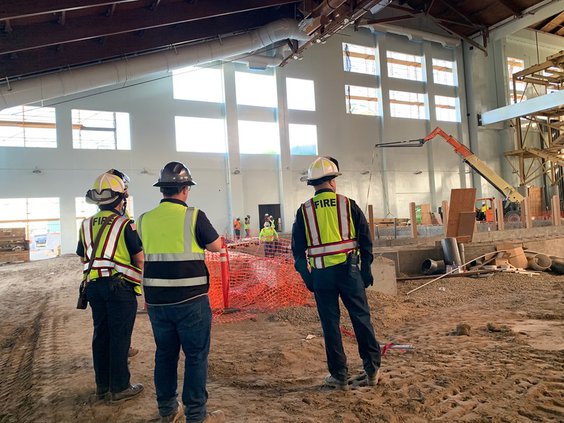The imposing 500-room Great Wolf Lodge indoor waterpark resort that will be the largest hotel in the Great Central Valley when it opens in mid-2020 is the result of the most “profitable” land deal ever engineered in Manteca if not all of Northern San Joaquin Valley.
The linchpin of the 10-year city effort that allowed Manteca to land a $180 million private sector investment was 29 acres the city purchased in 1973 for $20,200 for use as possible land disposal fields for treated wastewater. By the time 2050 rolls around, the city is projected to have parlayed that $20,200 land purchase into $129.1 million. That would be enough to cover the current single year general fund spending the city does almost three times.
The land when the city sold it to Great Wolf after Manteca got all of the necessary environmental hurdles cleared as well as putting infrastructure in place that allowed it to market a shovel ready indoor water park project had a fair market value of $6,750,000.
As part of the incentive to secure Great Wolf, the city sold the property to Great Wolf at a tenth of its value — $675,000. The city had to meet stringent state mandated economic benefit criteria in order to execute the deal.
The other part of the incentive package was sharing of the room tax revenue Great Wolf will generate for a period that ends after 25 years.
Much ado has been made of the impact that room tax will have on the city’s general fund that pays for day-to-day municipal services. Based on conservative projections made using how well other Great Wolf resorts have operated, Manteca will receive $2 million in the first full year of operations in the form of room taxes. That’s based on a 50-50 split.
After 10 years, Manteca’s share increases to 75 percent. Starting in the 26th year the room tax sharing deal ends and all money goes to the city.
Land that was intended originally only to dispose treated wastewater will provide Manteca with a private sector employer that will create 250 fulltime jobs and 250 part-time jobs. That is expected to provide overall paychecks of $8.9 million.
Not much attention has been focused on the property tax receipts.
A $180 million valuation would mean a basic annual tax bill of $1.8 million making it the city’s top property tax generating property out of the gate. Half of that — $900,000 — would go to the Manteca Unified School District. Roughly $400,000 would go to San Joaquin County. The rest would be split up among eight taxing agencies besides the City of Manteca.
Manteca expects to incur $350,000 annually in providing non-user fee based city services to Great Wolf such as police and fire. Subtracted from the $592,000 in property and sales taxes the city will receive in addition to its share of the room taxes, it would provide a net flow of $242,000 yearly into the general fund. That is on top of the $2 million annually in room taxes to help fund general city services and $123,000 yearly for Measure M public safety positions.
That means after one year of operation thanks to leveraging land the city bought for $20,200 some 46 years ago, the city will “net” $2.36 million annually. The land while Manteca owned it did not generate any tax revenue.
The original analysis of the deal projected Manteca would net $99.1 million during the first 30 years Great Wolf is open. Thanks to the voter approval of a measure that took the room tax up to 12 percent from 9 percent, the figure is now $129.1 million as all of the room tax increase goes to the city.
That means the city will have parlayed a $20,200 investment into $129.1 million.
To contact Dennis Wyatt, email dwyatt@mantecabulletin.com





